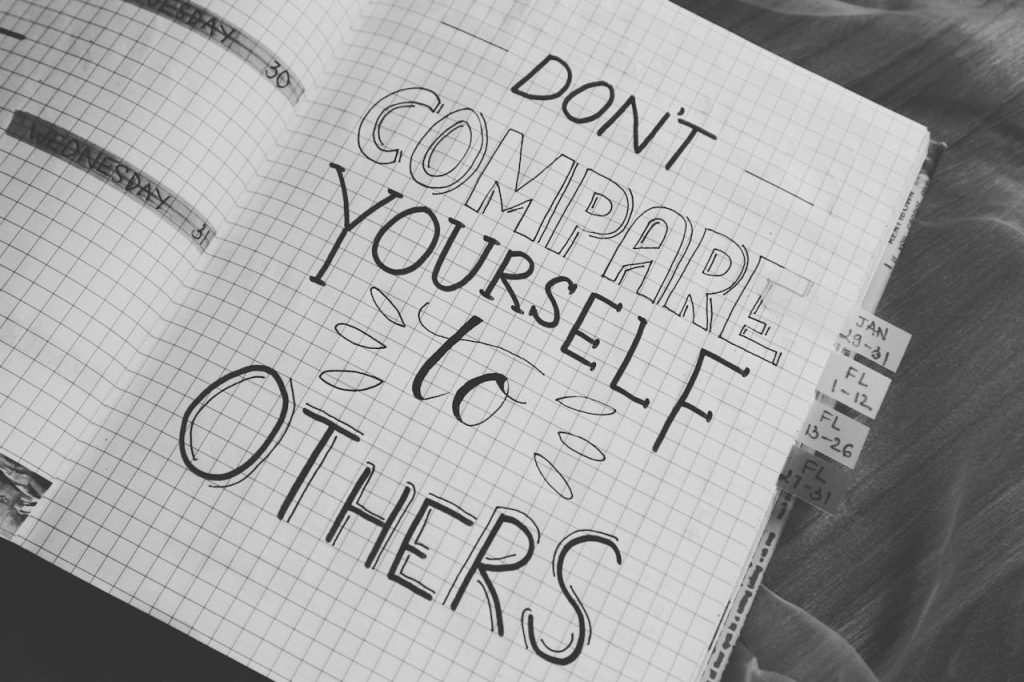
Image Source: pexels
In a world dominated by social media highlight reels and carefully curated online personas, the tendency to compare ourselves to others has reached epidemic proportions. This constant comparison not only drains our mental energy but also undermines our financial well-being as we chase lifestyles we can’t afford. Breaking free from the comparison trap isn’t just about improving your mental health—it’s a crucial step toward authentic financial independence and personal fulfillment. The good news? With practical strategies and a shift in perspective, you can finally liberate yourself from the exhausting cycle of measuring your worth against others.
1. Understand the True Cost of Comparison
The comparison habit extracts a far greater toll than most people realize, affecting everything from your bank account to your peace of mind. Research from the Journal of Social and Clinical Psychology shows that social comparison is directly linked to depressive symptoms and decreased life satisfaction. Financial decisions made from a place of comparison often lead to debt, as we purchase items to keep up with perceived standards rather than based on actual needs or values. Social media platforms have amplified this effect exponentially, creating an environment where we’re constantly exposed to others’ highlight reels while living in our behind-the-scenes reality. The psychological impact creates a scarcity mindset that makes it nearly impossible to feel content with your financial progress, regardless of your actual achievements. Understanding these hidden costs is the first step toward breaking free from comparison’s grip on your financial and emotional well-being.
2. Identify Your Unique Financial Values and Goals
Creating a personalized financial roadmap based on your authentic values eliminates the need to measure yourself against others’ journeys. Take time to reflect deeply on what truly matters to you—whether that’s travel experiences, education, family time, creative pursuits, or community impact—rather than what society or your social circle prioritizes. Financial goals aligned with personal values create intrinsic motivation that’s far more sustainable than the fleeting satisfaction of keeping up with others. Research demonstrates that value-aligned financial planning leads to greater long-term satisfaction and success. Your financial journey should reflect your unique circumstances, priorities, and timeline—comparing it to someone else’s path is like comparing apples to spaceships. Documenting your personal financial philosophy in writing can serve as a powerful reminder when comparison temptations arise.
3. Practice Financial Media Literacy
Developing critical awareness about how media influences your perception of “normal” financial behavior is essential for breaking the comparison cycle. Financial influencers, reality TV, and lifestyle content often present distorted realities that create unrealistic expectations about wealth accumulation and spending habits. According to Stanford researchers, most people significantly overestimate others’ financial well-being based on media consumption. Learning to recognize when content triggers comparison thoughts allows you to consciously interrupt this pattern before it affects your financial decisions. Curate your media consumption intentionally, following sources that provide educational value rather than those that promote lifestyle comparison. Implementing regular “comparison detox” periods—where you temporarily disconnect from platforms that trigger financial insecurity—can reset your perspective and strengthen your resistance to unhealthy comparison.
4. Cultivate Financial Gratitude Practices
Actively practicing gratitude for your current financial situation creates a powerful antidote to the scarcity mindset that fuels comparison. Research shows that gratitude interventions significantly reduce materialistic tendencies and improve financial decision-making. Creating a “financial wins” journal where you document progress, no matter how small, builds momentum and provides evidence of your unique journey when comparison thoughts arise. Regularly acknowledging the non-monetary abundance in your life—relationships, skills, opportunities, and experiences—helps maintain perspective when material comparisons threaten your contentment. Gratitude practices work most effectively when they’re specific rather than general, focusing on particular aspects of your financial situation rather than vague appreciation. Incorporating these practices into daily routines—perhaps during morning reflection or evening review—helps rewire neural pathways that previously defaulted to comparison thinking.
5. Build a Supportive Financial Community
Surrounding yourself with people who share healthy financial attitudes creates an environment where authentic progress is celebrated without comparison. Seek out friends, mentors, or communities who discuss money openly and honestly, without judgment or competition. Online communities focused on financial independence, debt freedom, or mindful spending can provide support while normalizing the full spectrum of financial journeys. Research from the American Psychological Association confirms that social support significantly improves financial resilience and decision-making quality. Establishing clear boundaries with individuals who trigger financial comparison or pressure is sometimes necessary for protecting your financial well-being. Creating regular opportunities for meaningful connection around shared values—rather than consumption or status—reinforces that relationships, not possessions or achievements, are the true measure of a rich life.
Your Freedom Journey Starts Now
Breaking the comparison habit isn’t a one-time decision but an ongoing practice of choosing authenticity over external validation. The strategies outlined above provide a framework, but your implementation will be as unique as your financial journey. Remember that occasional comparison thoughts don’t represent failure—they’re opportunities to practice redirecting your focus to what truly matters. As you gradually free yourself from the comparison trap, you’ll discover not just greater financial peace, but a more authentic relationship with yourself and others. The energy previously consumed by comparison becomes available for creating a life that reflects your true values—and that’s a form of wealth no financial metric can measure.
What comparison habit has been most difficult for you to break, and what strategy from this article might you try first? Share your thoughts in the comments below!
Read More
7 Lies Anxiety Tells You and How to Silence Them for Good
Think You Have High Self-Esteem? Not If You Put Up With These 5 Things
Leave a Reply